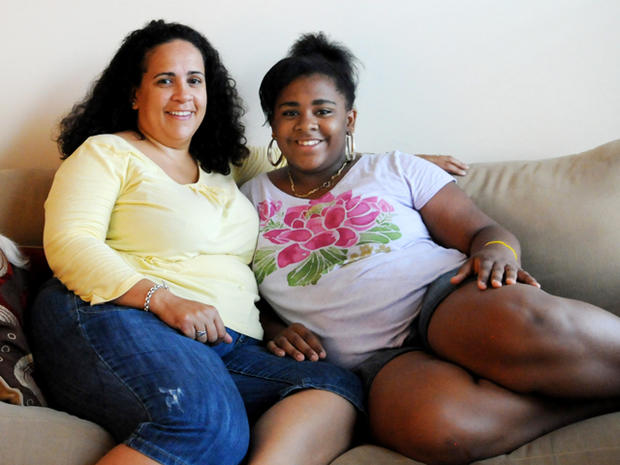Do extremely fat kids need foster parents?
(CBS/AP) Parents should lose custody of super obese children.
That's what a controversial commentary in one of the nation's most distinguished medical journals argues. And its authors are not the first to say the government should intervene in extreme cases of childhood obesity.
The opinion piece in the July 13 issue of the Journal of the American Medical Association says temporarily putting children in foster care is in some cases more ethical than obesity surgery.
It's already happened a few times in the U.S.
Dr. David Ludwig, an obesity specialist at the Harvard-affiliated Children's Hospital Boston and co-author of the article, says he first started thinking about this issue years ago, when a 90-pound 3-year-old girl came to his clinic. Her parents had physical disabilities, little money and couldn't control her weight. By age 12, she weighed 400 pounds and had developed cholesterol problems, diabetes, high blood pressure, and sleep apnea.
"Out of medical concern, the state placed this girl in foster care, where she simply received three balanced meals a day and a snack or two and moderate physical activity," Ludwig said. After a year, she lost 130 pounds. Today, she remains in foster care and though she is still obese, her diabetes and apnea have disappeared.
The point isn't to blame parents, Ludwig said, but rather to act in children's best interest and get them help that for whatever reason their parents can't provide.
Roughly 2 million U.S. children are extremely obese. Most are not in imminent danger, Ludwig said, but kids with obesity-related conditions like type 2 diabetes, breathing difficulties and liver problems could die by age 30 if no action is taken. It's these kids who should be considered for state intervention, Ludwig said.
State intervention "ideally will support not just the child but the whole family, with the goal of reuniting child and family as soon as possible. That may require instruction on parenting," said Ludwig.
But University of Pennsylvania bioethicist Art Caplan said he worries
that the debate puts too much blame on parents. Obese children
are victims of advertising, marketing, peer pressure -
things a parent can't control, according to Caplan.
"If you're going to change a child's weight, you're going to have to change all of them," he said.
JAMA isn't the only journal to publish a provocative argument on this subject.
Last year a British Medical Journal commentary by London pediatrician Dr. Russell Viner and colleagues said obesity was a factor in several British child protection cases. They claimed that child protection services should be considered if parents are neglectful or actively reject efforts to control an extremely obese child's weight.
A 2009 commentary in Pediatrics agreed that temporary removal from the home would be warranted "when all reasonable alternative options have been exhausted." That piece discussed a 440-pound 16-year-old girl who developed breathing problems and nearly died at a University of Wisconsin hospital. Doctors discussed whether to report her family for neglect. But they didn't need to - her medical crisis "was a wake-up call" for her family and the girl ended up losing about 100 pounds, said co-author Dr. Norman Fost, a medical ethicist at the university's Madison campus.
State intervention for obese children won't necessarily require new laws, said Ludwig. Doctors are required to report children who are at immediate risk, and that can be for a variety of reasons - including neglect, abuse or when kids are severely underweight - so why not also when they are severely overweight?
Stormy Bradley, an Atlanta mother whose overweight 14-year-old daughter is participating in a Georgia advocacy group's "Stop Childhood Obesity" campaign, sympathizes with families facing legal action over their kids' weight. She said healthier food is more expensive, and trying to monitor kids' weight can be difficult, especially when they reach their teens and shun parental control.
But taking youngsters away from their parents "definitely seems too extreme," she said.
Just ask Jerri Gray, a single mother from Greenville, S.C., who lost custody of her 555-pound 14-year-old son two years ago. She said authorities don't understand the challenges families face when trying to control their kids' weight.
"I was always working two jobs so we wouldn't end up living in ghettos," Gray said. She'd buy her son fast food when she didn't have time to cook. She said she asked doctors for help for her son's big appetite but was accused of neglect.
Her sister has custody of the boy, now 16. She has the money to help him with a special diet and exercise, and the boy has lost more than 200 pounds, Gray said
But at what cost?
"Even though good has come out of this as far as him losing weight, he told me just last week, 'Mommy, I want to be back with you so bad,' They've done damage by pulling us apart."
What do you think? Should extremely obese kids get taken from their homes?
